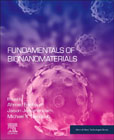
Fundamentals of BioNanomaterials
Barhoum, Ahmed
Jeevanandam, Jaison
Danquah, Michael K.
Fundamentals of Bionanomaterials covers the fundamental aspects, experimental setup, synthesis, properties, and characterization of different types of bionanomaterials. Sections cover the different structure and unique properties of bionanomaterials that can be obtained by modifying their morphology and composition, highlighting a wide range of fabrication techniques and critical processing parameters. Bionanomaterials have drawn much attention for their use in a range of industrial applications, including scaffolds, dental implants, drug delivery, dialysis, biobatteries, biofuel cells, air purification, and more. This is an important reference source for anyone seeking to gain a solid understanding on the characterization, properties and processing of bionanomaterial classes. Bionanomaterials are molecular materials composed partially or completely of biological molecules or key biological structures such as proteins, enzymes, viruses, DNA, biopolymers, metals, metal oxides, and carbon nanomaterials with characteristic bioactivity. Hence, the intensive research in this area is moving towards the design and use of bionanomaterials for industrial applications. Explains the major properties and characterization techniques for a range of bionanomaterial classesDiscusses the commercialization of different types of bionanomaterials for a variety of industry sectorsHighlights the challenges and interdisciplinary perspective of bionanomaterials in science, biology, engineering, medicine, and technology, incorporating both fundamentals and applications INDICE: Part I: Fundamentals of Bionanomaterials 1. Introduction to bionanotechnology and bionanomaterials 2. Types and classifications of bionanomaterials 3. Roles of bionanomaterials in nature: plants, animals, human 4. Chemical structure and of bionanomaterials 5. Self-assembly of bionanomaterials Part II: Experimental setup and synthesis techniques 6. Physical techniques for synthesis of bionanomaterials 7. Chemical techniques for synthesis of bionanomaterials 8. Biological techniques for synthesis of bionanomaterials 9. Extraction of bionanomaterials from natural sources 10. Synthesis of polymer-based bionanomaterials 11. Synthesis of ceramic-based bionanomaterials 12. Synthesis of metal-based bionanomaterials 13. Synthesis of metal oxide-based bionanomaterials 14. Synthesis of carbon-based bionanomaterials 15. Synthesis of bionanomaterials from waste materials Part III: Surface functionalization and processing techniques 16. Gas phase modification of bionanomaterials 17. Liquid phase modification of bionanomaterials 18. Surface grafting towards high-performance bionanomaterials 19. DNA nanoengineering 20. Surface functionalization of bionanomaterials for textile applications 21. Surface functionalization of nano-bioglass Part IV: Unique properties and characterization of nanocelluloses 22. Toxicity of nanomaterials 23. Antibacterial properties of nanomaterials 24. Biocompatibility of bionanomaterials 25. Antimicrobial properties of nanomaterials 26. Characterization of bionanomaterials 27. Challenges and future aspects for commercialization of bionanomaterials
- ISBN: 978-0-12-824147-9
- Editorial: Elsevier
- Encuadernacion: Rústica
- Páginas: 650
- Fecha Publicación: 01/06/2021
- Nº Volúmenes: 1
- Idioma: Inglés
